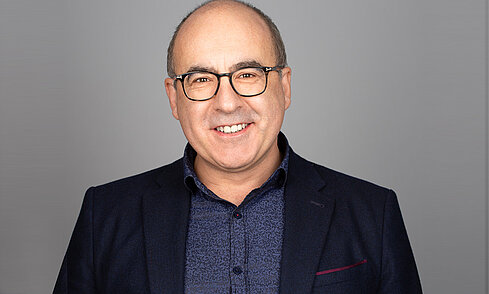Former winner encourages early-career scientists to apply for the Eppendorf Award

On the occasion of the 30th presentation of the Eppendorf Award for Young European Investigators on July 3, 2025 at the Advanced Training Center of the EMBL in Heidelberg, we interviewed Professor Sir Stephen Jackson, University of Cambridge, UK. He was the first winner of the Eppendorf Award in 1995.
In 1995 you were the first Eppendorf Award winner. What was the title of your award application?
A close colleague of mine suggested that I should apply for this award. If it wasn’t for this and his insistence, I wouldn’t have applied, but I’m glad that I did!
The title of my award application related to my early independent work on mechanisms of gene transcription and my latest work at that time identifying and characterizing the enzyme DNA-PK. It was this later work, particularly me showing that DNA-PK is involved in DNA repair, that provided the basis for most of my ensuing works over the next 30 years, focusing on mechanisms of DNA repair and connecting them to human health and disease.
What direction will cancer research take in the next decade?
I do not know which direction cancer research will take over the coming years, but I suspect that it will continue to involve passionate and innovative scientists, clinicians and cancer patients working together, combining older approaches and technologies with newer ones, including those underpinned by big data. It is my belief that as we learn ever more about the molecular underpinnings of different cancers, this will open up ways to use medicines in tailored ways that are optimal for the individual patient.
What do you think is the role of the Eppendorf Award in the scientific community?
In my view, the award is unique in that it highlights the achievements of younger researchers who are only just in the process of breaking into the world arena, thereby helping them at crucial times in establishing their international identities and credentials.
Did winning the Award help your career / encourage you in any way? If so, how?
I can honestly say that me receiving this award was pivotal to my career progression. It played a crucial role in helping the University of Cambridge to offer me a tenured full professorship, and in doing so positively altered – and indeed transformed – the trajectory of my career and life.
Upon receiving the first award, I had no idea about how prominent and important the Eppendorf Award for Young European investigators would turn out to be. I was proud at the time but now I’m even more proud at being one of the amazing set of scientists who have received the award over the past 30 years. It is great to know that the award will continue to celebrate and support new European young investigators, hopefully for many years to come.
What advice would you give to young scientists thinking of applying for this award?
If you’re not sure whether you should apply for this award I would suggest that you ask colleagues whom you know well and respect. But in the end, if you think you are worthy candidate, do not talk yourself out of it and put yourself forward.
About Stephen Jackson
Prof. Sir Stephen Jackson FRS, FMedSci is the University of Cambridge Frederick James Quick Professor of Biology and a Senior Group Leader at the Cancer Research UK Cambridge Institute.
He obtained his first degree from Leeds University and did his PhD research with Jean Beggs on yeast mRNA splicing. After his post-doctoral research with Robert Tjian at Berkeley, California, where he developed an interest in the regulation of transcription, he returned to the UK in 1991 as a Junior Group Leader at the then Wellcome-CRC Institute (now the Gurdon Institute). Here, he continued his research into transcription by eukaryotic RNA polymerases II and III and expanded this work to include the transcriptional apparatus of Archaea. Through identifying and characterising the functions of the DNA-dependent protein kinase, he was led into the field of DNA repair and DNA-damage signalling, which has has been the major focus of his academic group.
Prof. Sir Stephen Jackson is not only a leading scientist in cancer research, but also a very successful entrepreneur who, in 1997, founded his first company KuDOS Pharmaceuticals. In 2010 he co-founded Mission Therapeutics to exploit new therapeutic opportunities in oncology and in 2018 he co-founded Adrestia Therapeutics.
In June 2023 Stephen Jackson was awarded a knighthood in the King’s first Birthday Honours List. He was recommended for the honour of Knight Bachelor for his outstanding services to innovation and research.
About the Award
The Eppendorf Award for Young European Investigators was first established in 1995 on occasion of Eppendorf’s 50th anniversary. It is granted annually to one early career scientist in Europe not older than 35 years at the time of entry and acknowledges outstanding contributions to biomedical research in Europe based on methods of molecular biology, including novel analytical concepts. The winner is selected by an independent expert committee chaired by Prof. Laura Machesky (Department of Biochemistry, University of Cambridge, UK).
